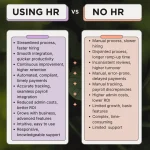In today’s data-driven world, the potential of machine learning (ML) in transforming human resource management (HRM) is immense. By embedding ML-based prediction models into HRM software, businesses can achieve more efficient, accurate, and proactive decision-making. ZOKO HR is at the forefront of this technological advancement, leveraging cutting-edge ML prediction models to optimize key HR functions, from recruitment and retention to employee performance management and payroll forecasting.
This blog delves into how ZOKO HR integrates machine learning prediction models into its HRM software to enhance workflow efficiency, streamline processes, and create a smarter workplace.
1. Recruitment and Talent Acquisition: Predictive Hiring with ML
Hiring the right talent is one of the biggest challenges faced by HR departments today. The traditional recruitment process can be tedious and often relies on subjective decision-making. However, ZOKO HR’s machine learning-driven recruitment module transforms this process by leveraging prediction models that analyze candidate data to identify those most likely to succeed within the company.
How ML Prediction Models Improve Recruitment:
- Predictive Candidate Scoring: ZOKO HR’s ML algorithms analyze past hiring data and patterns to predict which candidates are most likely to perform well based on their qualifications, skills, and behavioral traits. This reduces the chances of bad hires, saving the company both time and resources.
- Resume Parsing and Keyword Matching: The software scans and parses resumes efficiently using natural language processing (NLP) models, ranking applicants based on how well they fit the job criteria. This automated analysis ensures the best-suited candidates are shortlisted without human bias.
- Attrition Prediction: ZOKO HR’s ML model can predict a candidate’s likelihood of leaving the organization within a short time frame based on previous data trends, helping HR make more informed decisions about whom to hire.
By incorporating ML-based predictions in recruitment, ZOKO HR saves HR teams valuable time and reduces the cost-per-hire, ultimately streamlining the entire recruitment and onboarding process.
2. Employee Retention: Predictive Analysis for Workforce Stability
Employee turnover is a major issue for many companies, leading to higher costs, lower morale, and disruptions in workflow. Machine learning can help mitigate this challenge by predicting which employees are at risk of leaving and why, allowing HR to intervene proactively.
How ML Prediction Models Help with Retention:
- Turnover Risk Prediction: ZOKO HR’s predictive models analyze factors such as engagement scores, performance metrics, attendance patterns, and even social network analysis within the organization to predict employees who may be at risk of leaving. The model flags high-risk employees so HR managers can address their concerns before they decide to leave.
- Job Satisfaction and Sentiment Analysis: By analyzing feedback, surveys, and performance reviews, ZOKO HR can gauge employee satisfaction levels. ML models interpret the sentiment behind responses, enabling HR to take necessary steps to improve job satisfaction and employee engagement.
- Proactive Retention Strategies: Armed with predictive insights, HR managers can offer tailored interventions like personalized training, promotions, or salary adjustments to keep high-performing employees engaged and prevent costly turnover.
Through these predictive retention features, ZOKO HR helps businesses maintain workforce stability and fosters a more committed and satisfied workforce.
3. Performance Management: Enhancing Productivity through Predictive Insights
Performance evaluation has traditionally been a backward-looking process. However, with ZOKO HR’s ML-based prediction models, performance management becomes a forward-looking, proactive function that enhances productivity and optimizes talent management.
How ML Prediction Models Enhance Performance Management:
- Performance Forecasting: ZOKO HR analyzes historical performance data, project outcomes, and individual employee KPIs to predict future performance trends. This helps managers identify high-potential employees early on and offer additional growth opportunities to boost their productivity.
- Real-Time Feedback Loops: By continuously collecting and analyzing data from ongoing projects, ZOKO HR provides managers with real-time feedback on employee performance. Predictive models suggest when and how to intervene with feedback to correct issues before they escalate, ensuring that performance stays on track.
- Training Recommendations: ZOKO HR uses machine learning to assess employees’ skills gaps and performance trends, suggesting targeted training programs to enhance employee skills where needed. This results in continuous skill development and better alignment of talent with business goals.
With ZOKO HR’s ML-driven performance management, companies can optimize employee performance, nurture talent, and ensure that individual contributions align with business objectives.
4. Compensation and Payroll Forecasting: Accuracy through Predictive Models
Payroll is one of the most critical functions of HR, and any errors or delays in compensation can significantly impact employee morale and productivity. ZOKO HR’s ML-based prediction models take payroll management to the next level by forecasting compensation trends and optimizing payroll workflows.
How ML Prediction Models Improve Payroll Forecasting:
- Accurate Payroll Predictions: By analyzing employee attendance, leave records, overtime, and other payroll factors, ZOKO HR’s machine learning models can predict payroll expenses with pinpoint accuracy. This helps businesses forecast payroll costs and manage budgets more effectively.
- Compensation Trend Analysis: ZOKO HR’s ML model predicts future compensation trends based on historical data, industry benchmarks, and economic factors. It enables HR managers to plan salary increases, bonuses, and other compensation adjustments, ensuring competitive and fair remuneration.
- Overtime and Productivity Insights: By analyzing work patterns and productivity levels, ZOKO HR can predict the likelihood of overtime for specific departments or employees, helping HR managers allocate resources better and avoid burnout.
These predictive insights into payroll management improve the accuracy and efficiency of compensation processes while enhancing financial planning for HR departments.
5. Employee Engagement: Predicting Workplace Satisfaction
Employee engagement is a key driver of productivity and company success. ZOKO HR’s ML prediction models help HR departments proactively monitor and enhance engagement levels by analyzing data across various touchpoints.
How ML Prediction Models Drive Employee Engagement:
- Engagement Forecasting: ZOKO HR’s predictive models analyze data from surveys, internal communication, and social engagement patterns to forecast employee engagement levels. By identifying when engagement may decline, HR teams can take preemptive steps to improve workplace morale.
- Tailored Engagement Programs: Based on predictive insights, ZOKO HR can recommend personalized engagement strategies for different teams or departments. Whether through team-building activities, mentorship programs, or recognition initiatives, ZOKO HR helps HR leaders design targeted engagement interventions.
- Real-Time Monitoring: ZOKO HR enables HR teams to monitor employee engagement in real-time, offering insights into the immediate impacts of management decisions, workplace changes, or new policies. This allows businesses to act quickly and make adjustments that sustain high levels of engagement.
With the power of ML-driven employee engagement forecasting, ZOKO HR empowers HR teams to create a thriving work environment where employees feel valued and motivated.
6. Learning and Development: Personalized Learning Pathways
In today’s knowledge economy, continuous learning is essential for both employee development and organizational growth. ZOKO HR’s ML models bring a new level of sophistication to learning and development (L&D) by personalizing learning pathways and predicting future skill needs.
How ML Prediction Models Transform L&D:
- Personalized Learning Recommendations: By analyzing employees’ current skills, performance metrics, and career progression, ZOKO HR recommends personalized learning and development courses tailored to each employee’s unique needs. This ensures that employees receive targeted training that enhances their performance.
- Predicting Future Skill Needs: ZOKO HR’s predictive models can anticipate emerging skill requirements based on industry trends and company goals. This allows businesses to proactively upskill their workforce to meet future demands, ensuring competitiveness in the marketplace.
- Training Impact Prediction: ZOKO HR analyzes the effectiveness of past training programs to predict the potential impact of future courses on employee performance. This helps HR teams optimize their L&D investments by focusing on the most impactful training initiatives.
By integrating predictive ML models into the learning and development process, ZOKO HR ensures that employees are always equipped with the right skills to thrive in their roles and contribute to the company’s success.
7. HR Analytics: Data-Driven Decision Making
The heart of ZOKO HR’s machine learning capabilities lies in its powerful HR analytics engine. By turning raw data into actionable insights, ZOKO HR enables HR leaders to make smarter, data-driven decisions that enhance workforce productivity and organizational efficiency.
How ML Prediction Models Drive HR Analytics:
- Predictive Workforce Analytics: ZOKO HR’s ML models provide predictive insights into workforce trends, from talent shortages to performance fluctuations. These insights enable HR leaders to make proactive decisions that keep the workforce agile and adaptable.
- Cost Optimization: ZOKO HR analyzes data on hiring, payroll, training, and other HR activities to predict future HR-related expenses. This helps businesses optimize costs and allocate resources more effectively.
- Data-Driven Decision Making: With real-time analytics and predictive modeling, ZOKO HR ensures that HR leaders base their decisions on accurate, data-backed insights rather than assumptions or gut feelings.
Incorporating machine learning into HR analytics not only improves decision-making but also positions businesses to stay ahead in an increasingly competitive market.
HRM with ZOKO HR’s Machine Learning Models
ZOKO HR’s machine learning prediction models are reshaping the future of human resource management by enabling smarter, faster, and more efficient workflows. By automating and optimizing core HR functions such as recruitment, retention, performance management, payroll forecasting, and employee engagement, ZOKO HR helps businesses create a more agile and data-driven HR department.
By embracing machine learning technology, ZOKO HR empowers organizations to focus less on administrative tasks and more on strategic initiatives that drive business success.





